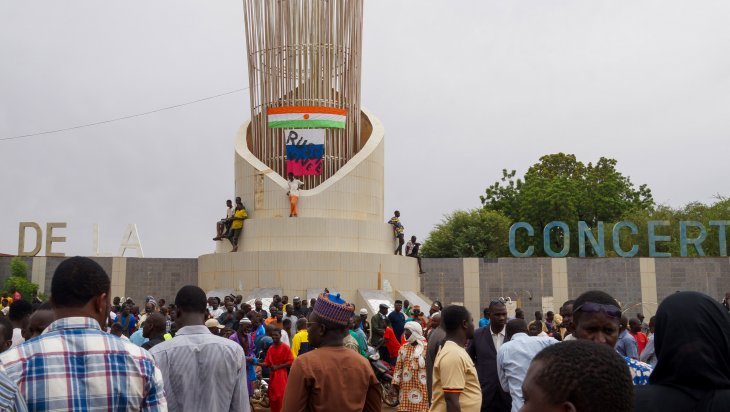Coup Ecosystem in the Sahel and Niger

Situated at a strategic location between North and West African countries, Niger is a country that regional and global interactions directly affect. With a population of approximately 25 million, Niger is among the top three poorest countries in the world in 2023, but it has various mineral resources, especially uranium and oil. In addition to that Niger has been fighting against the terrorist movements in the region for the last 10 years. The security problem in the region, called the Sahel crisis, threatens Niamey along the borders of Niger's northern, western, and southern neighbors Libya, Mali, Burkina Faso, and Nigeria.
President Mohamed Bazoum's government, which has developed good relations with France, the United States, and other Western actors, was detained at the Presidential Palace on July 26 by the forces of the Presidential Guard Regiment. The coups in the Sahel belt, are stretching from Guinea to Sudan in the last four years. Hence the coups have been marked by a growing anti-Western sentiment in the societies of the region, with a particular focus on France. Also, Eastern actors particularly Russia seeks to fill the political, economic, and security vacuum left by Western actors such as in Mali and Burkina Faso. This situation points to a "coup ecosystem" characterized by increasing anti-French sentiment in regional societies and dominates African society with pan-Africanist ideas. From this point of view, this article/paper/analysis/piece examines the causes of the July 26 coup attempt in Niger, which gained independence from France in 1960, as well as its global and regional interactions.
Causes of the Coup: Domestic Politics, Regional and Global Interactions
Mohamed Bazoum was elected as the head of state in February 2021. However, shortly after taking office, he faced a coup attempt in March 2021. Bazoum stood out as the only ally of Western powers in the Sahel region, after its neighbors Mali and Burkina Faso, which in recent years have split from their Western allies and moved closer to Russia. In addition to that, he also opposed Mali and Burkina Faso’s cooperation with Wagner.
On 26 July, Niger's presidential Xaccount announced that the forces loyal to the Presidential Guard Regiment launched an anti-republic initiative, aiming to enlist the support of the National Armed Forces and the National Guard. It was also announced that President Mohamed Bazoum and his family were in good condition and that the army and the National Guard were ready to attack if the Presidential Guard Regiment did not abandon the coup attempt. The coup attempt was led by General Omar Tchiani, who has been the commander of the Presidential Guard Regiment for nearly 10 years. The reasons for the coup attempt will be analyzed through domestic politics, regional and global interactions.
Domestic Politics
In the context of domestic politics, inter-group disputes and economic problems are seen as the main causes of the coup. First of all, there are allegations that Bazoum wanted to dismiss General Omar Tchiani, the commander of the Presidential Guard Regiment, who had served in the same position under his predecessor Mahmoud Isafu. Based on these allegations, it is highly likely that Tchiani will attempt to remove the president before President Bazoum can remove him.
Although the reasons for the coup in Niger remain unclear, the political and economic atmosphere in the country is another reasons that paved the way for the coup. As a matter of fact, the economic difficulties in Niger and the increasing cost of living caused serious discontent among the people. The inefficient use of resources in economic policy, allegations of corruption, and the government's inability to adequately respond to the needs of the people led to discontent and rebellion in the society.
Regional and Global Interactions
In the context of regional interactions that paved the way for the coup, the ecosystem against the terrorist threat in the Sahel is worth noting. This ecosystem has been formed in Niger's neighbors Mali and Burkina Faso due to the coups carried out by anti-Western soldiers in the last two years. Indeed, the Sahel is a region where rebel groups are active in many countries that border Niger. The failure of the Niger government to contain the rebel insurgency has led to security concerns and distrust of political leaders. People in the region have been concerned about the government's inability to ensure the security of the country. Moreover, the increase in military coups in the region has shaken the confidence of the Niger population in the current government and undermined the stability of political leaders.
In this context, it can be noted that Niger has received security-specific support from Western countries to prevent instability in the Sahel region. For instance, the US has a drone base in the Agadez region of Niger under AFRICOM to gather intelligence on the terrorist case in the Sahel, while France aims to contribute to the fight against terrorism in the region with its 1,100 troops. On the other hand, both countries export training and security equipment to the Niger Army. In this context, the US and France are under diplomatic pressure to condemn the coup in Niger and to reinstate Bazoum. From this point of view, it is highly likely that Russia will fill the security vacuum that will arise as a result of the coup in Niger, as expected in Mali and Burkina Faso. Indeed, Russian political scientist Aleksandr Dugin has expressed his satisfaction with the coup in Niger.
The coup in Niger points to a worrying situation for the region. Indeed, the terrorist threat in Niger's neighboring countries, the coup ecosystem in question, and global interactions have repercussions on Africa in the Sahel. Therefore, in terms of regional developments, the Niger coup is likely to include Chad in the coup ecosystem after Libya, Sudan, Mali, and Burkina Faso. As a matter of fact, there is a repressed opposition segment in Chadian society that has been gaining strength against the current administration, and the opinions circulating in the society are noteworthy, as in the cases of Sudan, Mali, Burkina Faso, and Niger.
Geopolitical ruptures in the Sahel may deepen since the Economic Community of West African States (ECOWAS) led by Nigeria, pushes the coup government to hand over power to Bazoum. Which in this case Burkina Faso and Mali threatened to declare war against possible Western support in Niger. This could accelerate the east-west confrontation in the Sahel, with proxy forces in the form of terrorist movements, which would have a significant negative impact on the loss of democratic gains as well as the ability of the countries of the region to benefit from their natural resources.
In conclusion, one of the main causes of the coup d'état in Niger is the disagreements between the military leadership and the Bazoum administration. Auxiliary reasons are economic problems and the reflections of the anti-Western ecosystem, in particular France, among the people of the region. However, these circumstances do not indicate that the leaders who initiated the coup attempt were anti-France, anti-American, or pro-Russian. As a matter of fact, there is no data on this claim. However, the instability in the region has likely set the stage for the consolidation of power of these groups by Western and Eastern actors. Moreover, this situation will increase traffic on the Central and Western Mediterranean migration routes, leaving European countries to face a new migration problem.








